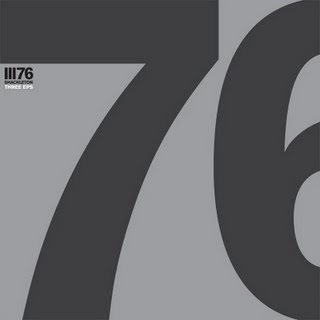
Shackleton
Three EPs
(Perlon; 2009)
By Chet Betz | 9 December 2009
Arguably, 2009’s two most striking releases in dubstep were two 12 inches. One (Joy Orbison’s “Hyph Mngo/Wet Look”) was a cheeky bliss-out; the other was a resolute ascension that escaped Earth’s gravity and took orbit somewhere around aesthetic nirvana. Skull Disco nomad Shackleton, relocated to the Berlin stone halls of Perlon (hellooo, Villalobos), here delivers his debut LP for that label, and though you might still classify Shack’s jams as dubstep, Three EPs couldn’t sound less like those two other genre highlights for the year. Well, maybe if Rivers Cuomo were singing over it or something, sure. But unlike the skyrocket tactics of its peers and certainly unlike Rivers Cuomo, Three EPs is interested in the fastidious long haul, boots planted firmly on the ground—“ground” being an icy ship deck.
Opener “(No More) Negative Thoughts” shows immediately the influence of Berlin (instructional vocal clip used so seriously it’s goofy? check!) while on the surface all the patches and the composition display a sort of sterile virtuosity, a smug familiarity, the kind of “good” electronica/house work that’s satisfying on one hand but not exactly auspicious or exciting enough to point one’s expectations toward sublimity. Then, like half a dozen minutes later, the track reaches a point where you stop, rewind it a minute, and think, “hey, that part’s kind of sublime,” Shackleton having resolved on one note of his main motif for the rest of his effects to whirl around and also giving the track some force with a salvo of rapid hat-play. So, right off the bat the philosophy’s established: Shackleton did not come to “transcend” or to coddle pop sensitivities. Shackleton came to do some serious dub.
Three EPs is a throwback of sorts, showing devotion to house’s art of delayed gratification (and here it really does come off as “art,” not just gimmick) but even when Shackleton’s gratifying you he’s doing it with those same elements you never thought you’d find gratifying—the brood of dark presets and stereo-crushingly impressive tricks that just weigh on you when you hear them in contexts less immaculately composed and percussively freaked than these. By removing attention from the “sound” of his individual elements in the first half of this record, Shackleton reveals that what he’s doing is like a master class in the virtues of expert construction and a subtle dynamic. Then, when Shackleton ups the distinction of his components—the woozy synth and syncopated toms of “Moon over Joseph’s Burial” (a startling effect reminiscent of Pinch’s “Lazarus”), the colloidal bass runs and almost humorous chant sample (“He’s got the whole world in His hands”) of “Asha in the Tabernacle,” etc.—while maintaining his sophisticated structures, it only makes the impact that much more noteworthy. And micro-hooks on nearly every track provide some levity; it’s only on too aptly named closer “Something Has Got to Give” that the austerity becomes oppressive, a taciturn arch of the eyebrow at any hopes wrongly inferred from the track’s title that just maybe Shack was gonna let it all hang out for his finale.
While Shackleton insists that the LP is named Three EPs because he didn’t feel like treating it as an Album with a concept and all that (Perlon founder Zip helped Shackleton pick out material for the release from his live sets), there’s also an implication in a title such as this about just the kind of work that it would take for a meticulous craftsman like Shackleton—and also would take for many of his detail-oriented contemporaries—to release a full-length. Regardless, in a world made of inches Shackleton’s managed to cull together an hour of music that has an arc to the development of its method and is unified by a singular character, whether he sees it as an album or not. And what is the “singular character” of this music? Shackleton’s namesake invokes qualities such as perseverance, long-suffering, the grim rigor of grindin’ just to survive; if there’s any dubstep record that deserves those implications (and in a good way), it’s Three EPs.





